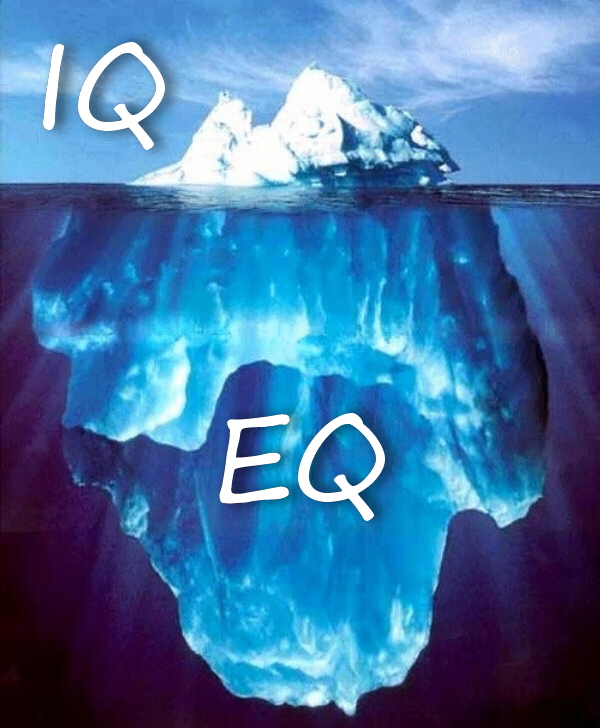Emotional Intelligence
Reason Leads To Conclusions, Emotion Leads To Action
Emotions Get In The Way Or Get You On The Way
What Is Emotional Intelligence?
The concept of "Emotional Intelligence" also referred to as "Emotional Quotient" [EQ] rose to prominence as a behavioural model with Daniel Goleman's 1995 book of the same name.
The original theory was developed twenty years previously by psychologists Howard Gardner , Peter Salovey and John 'Jack' Mayer.
The EQ model suggests that the conventional measure of intelligence [IQ], is too narrow and that there are wider areas of the emotional dimension that have a significant bearing on how we behave and perform in social and work situations, and thus on our success.
Goleman defines emotional intelligence as:
"The capacity for recognizing our own feelings and those of others, for motivating ourselves, and for managing emotions well in ourselves and in our relationships"
He proposes that this is a learned capability. In other words, unlike the traditional measures of intellectual intelligence which cannot be learned, we can learn, practise and develop competencies that will expand and increase our emotional intelligence.
The 2 key themes
- Understanding yourself, your goals, intentions, responses, behaviour and all
- Understanding others, and their feelings
Goleman identified five key competencies of EQ as:
- Knowing your emotions.
- Managing your own emotions.
- Motivating yourself.
- Recognising and understanding other people's emotions.
- Managing relationships, i.e. managing the emotions of others.
Emotional Intelligence - Overview by Daniel Goleman
Emotional Intelligence - The 5 Competencies
Personal Skills
This is about how we manage ourselves, for example: optimism, persistence in pursuing goals despite obstacles and setbacks
- Self-awareness - Knowing one’s internal states, preferences, resources and intuitions
# Emotional awareness - Recognizing one’s emotions and their effects
# Accurate self-assessment - Knowing one’s strengths and limits
# Self-confidence - A strong sense of one’s self-worth and capabilities - Self-regulation - Managing one’s internal impulses and resources
# Self-Control - Keeping disruptive emotions and impulses in check
# Trustworthiness - Maintaining standards of honesty and integrity
# Conscientiousness - Taking the responsibility for personal performance
# Adaptability - Flexibility in handling change
# Innovation - Being comfortable with novel ideas, approaches, and new information - Motivation - Emotional tendencies that guide or facilitate
reaching goals
# Achievement drive - Striving to improve or meet a standard of excellence
# Commitment - Aligning with goals of the group or organization
# Initiative - Readiness to act on opportunities
Social skills
This is about how how we manage relationships, for example:team capabilities, creating group synergy in pursuing collective goals
- Empathy - Awareness of other’s feelings, needs, and concerns
# Understanding others Sensing others’ feelings and perspectives, and taking active interest in
their concerns
# Developing others - Sensing others’ development needs and bolstering their abilities
# Service orientation - Anticipating, recognizing, and meeting customers’ needs
# Leveraging diversity - Cultivating opportunities through different kinds of people
# Political awareness - Reading a group’s emotional currents and power relationships - Social Skills - Adeptness and inducing desirable responses in
others
# Influence - Wielding effective tactics for persuasion
# Communication - Listening openly and sending convincing messages
# Conflict management - Negotiating and resolving disagreements
# Leadership - Inspiring and guiding individuals and groups
# Change catalyst - Initiating or managing change
# Building bonds - Nurturing instrumental relationships
# Collaboration & cooperation - Working with others toward shared goals
How To Use Emotional Intelligence
Emotional intelligence can be applied in many different areas of your life, and it will include some of the following behaviours:
- Accepting criticism and responsibility
- Not dwelling on mistakes and failures and moving on
- Saying No when it is appropriate and you need to
- Appropriately displaying empathy and sharing your feelings
- Building win-win solutions that benefit all parties
- Listening mindfully
- Self knowledge about your own motives and drivers
- Non judgemental in your assessments of others' behaviours
The 7 Habits Of Emotionally Intelligent People
Resources
Emotional Intelligence - Review [slide presentation]
Emotional Intelligence - Book Review
Return to: Managing Personal Change
LATEST ARTICLES
The Kingdom Is Here, Now Awakening Is Not Later -
 What contemplative traditions point to - and how progress quietly replaces presence. Across contemplative traditions, a strikingly consistent message appears: truth is not somewhere else, not in the…
What contemplative traditions point to - and how progress quietly replaces presence. Across contemplative traditions, a strikingly consistent message appears: truth is not somewhere else, not in the…Does Prayer Work? The Psychology of Prayer, Meditation and Outcomes
 Reality Is A Complex System Of Countless Interactions - Including Yours. So does prayer work? The problem is that the question itself is usually framed in a way that guarantees confusion. We tend to a…
Reality Is A Complex System Of Countless Interactions - Including Yours. So does prayer work? The problem is that the question itself is usually framed in a way that guarantees confusion. We tend to a…Living in Survival Mode Without Surrendering Mental Authority
Living in Survival Mode Without Surrendering Mental Authority
 Clear Thinking When You’re Just Trying to Stay Afloat. Many people today are overwhelmed because they are living in survival mode - not temporarily, but as a persistent condition of life. For many, th…
Clear Thinking When You’re Just Trying to Stay Afloat. Many people today are overwhelmed because they are living in survival mode - not temporarily, but as a persistent condition of life. For many, th…Manifestation Without Magic: A Practical Model
 Manifestation without magic is not a softer or more intellectual version of popular manifestation culture. It is a different model altogether. Popular manifestation teachings tend to frame reality as…
Manifestation without magic is not a softer or more intellectual version of popular manifestation culture. It is a different model altogether. Popular manifestation teachings tend to frame reality as…Staying Committed When You Can't See Progress - The Psychology of Grit
 Uncertainty Is Not The Absence Of Progress, Only The Absence Of Reassurance. One of the most destabilising experiences in modern life is not failure, but uncertainty and staying committed when you can…
Uncertainty Is Not The Absence Of Progress, Only The Absence Of Reassurance. One of the most destabilising experiences in modern life is not failure, but uncertainty and staying committed when you can…The Battle For Your Mind - How To Win Inner Freedom In A Digital Age Of Distraction
 From External Events to Inner Events. We often think of “events” as things that happen out there: the traffic jam, the rude comment, the delayed email reply. But what truly shapes our experience is wh…
From External Events to Inner Events. We often think of “events” as things that happen out there: the traffic jam, the rude comment, the delayed email reply. But what truly shapes our experience is wh…How to See Your Thoughts Without Becoming the Story
 A Practical Guide to Thought-Awareness. You can spend your life inside the stories of your mind without ever learning how to see your thoughts clearly and objectively. Most of the stuff we tell oursel…
A Practical Guide to Thought-Awareness. You can spend your life inside the stories of your mind without ever learning how to see your thoughts clearly and objectively. Most of the stuff we tell oursel…The Collison Decision Matrix - A Simple Framework for Better Choices
 The Collison Decision Matrix Is A Practical Everyday Thinking Tool. Most of us spend a surprising amount of time worrying about decisions. From small ones such as what to wear, what to eat, what to te…
The Collison Decision Matrix Is A Practical Everyday Thinking Tool. Most of us spend a surprising amount of time worrying about decisions. From small ones such as what to wear, what to eat, what to te…The Power Of Asking The Right Question
 The Power Of Asking The Right Question Lies In The Quest For Insight. To experience the power of asking the right question you must develop the practice of asking questions. The best way to improve th…
The Power Of Asking The Right Question Lies In The Quest For Insight. To experience the power of asking the right question you must develop the practice of asking questions. The best way to improve th…Site Pathways
 Here is a site pathway to help new readers of Zen-Tools navigate the material on this site. Each pathway is based around one of the many key themes covered on this site and contain a 150 word introduc…
Here is a site pathway to help new readers of Zen-Tools navigate the material on this site. Each pathway is based around one of the many key themes covered on this site and contain a 150 word introduc…How To Live With Contradiction - Beyond Thought Let Stillness Speak
 A major impact on so many peoples' lives is the situational contradiction of unfilled realistic expectations. So where does all this leave us? Well here we are, with mental equipment that is more lim…
A major impact on so many peoples' lives is the situational contradiction of unfilled realistic expectations. So where does all this leave us? Well here we are, with mental equipment that is more lim…
